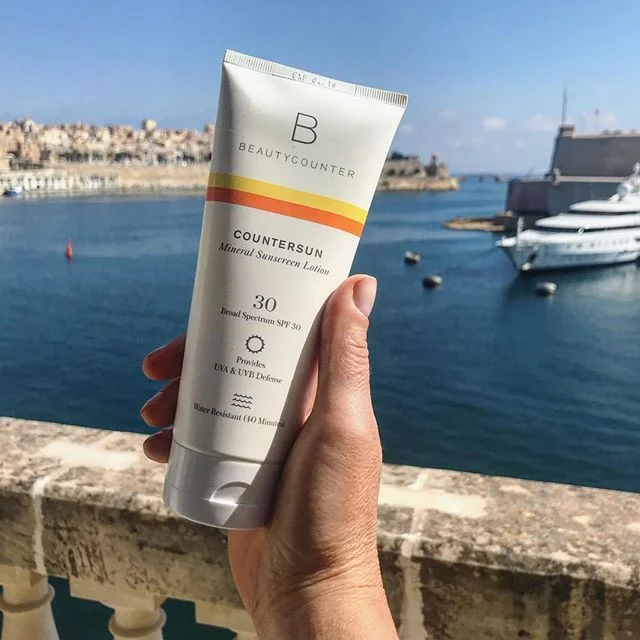The Not So Sunny Side of Sunscreen By Victoria Gregory

It’s summer and most of us have a ready-to-go beach bag filled with towels, beach toys, and of course, sunscreen. But have you given much thought to what’s in that sunscreen that you are slathering all over your and your kids’ skin?
I was at the beach last weekend and was inundated with the toxic smell of aerosol sunscreen wafting through the air. People all around me were spraying it all over their bodies and their kids’ faces without a second thought to what types of chemicals they might be inhaling and their effect on their health. After all, if it’s sold in the U.S., it must be safe! The FDA is surely looking out for us and our families, right? WRONG!
Although there have been countless articles written on the dangers of most sunscreens that you’ll find on the drugstore shelves, it seems that very few of us are paying attention. Whether at the beach or at the pool, most people are slathering themselves with known carcinogens or, worse yet (and my biggest pet peeve!), using aerosol spray-on sunscreens and releasing millions of nanoparticles (i.e., particles known for causing lung damage as well as developmental issues in animals) into the air that they (and everyone around them) is breathing.
My frustration inspired this blog, which will cover the facts and myths of sun exposure, touch on the importance of Vitamin D, talk about how to select right supplement, and of course, sunscreens (i.e., what to avoid and how to select a safer alternative). You can scroll down or click on the sections below to skip ahead:
THE SUN: FRIEND OR FOE?
The sun and sunlight have gotten a bad rap over the years. There is no denying that sun exposure comes with the risk of overexposure, leading to sunburn and possibly skin cancer. But the sun also provides our bodies with important health benefits, (e.g., production of vitamin D3, which is imperative to good health), and should not be avoided entirely, something many of us are lead to believe. As a result of this fallacy, Americans are using more sunscreen than ever before (using an SPF15 sunscreen can reduce vitamin D formation by as much as 99%) or choosing to completely avoid the sun altogether. It’s not surprising that nearly half of us suffer from a Vitamin D deficiency.
Why is Vitamin D a big deal?
Vitamin D, otherwise known as the “sunshine vitamin,” is vital to good health. It plays an essential role in maintaining healthy bones and regulating the immune system, among having many other important functions. Vitamin D exists in two forms: D2 and D3. Both forms of Vitamin D can be derived from eating certain foods, but the latter is the hormonally active form of vitamin D and is primarily derived from direct sun exposure. Consequently, inadequate sunlight exposure is one of the major risk factors for a vitamin D deficiency, which has been associated with many serious conditions, including;
-
Heart disease and diabetes
-
Lowered immune system response to viral infections (i.e., the cold and flu, among others)
-
Autoimmune disorders
-
Multiple sclerosis
-
Tuberculosis
-
Depression
-
Brittle bones, and even
-
Premature death (A University of California study found that people with an average age of 55 who had lower blood levels of vitamin D were twice as likely to die prematurely as those with higher levels)
Choosing a Vitamin D supplement
There are a number of factors that must go into choosing a Vitamin D supplement:
-
Choose Vitamin D3 (or cholecalciferol), which is the recommended form of vitamin D and the natural form of vitamin D that your body makes from sunlight
-
Make sure that your D3 supplement contains K2, as this duo works together for optimal health and maximum absorption
-
Avoid any supplements that contain synthetic preservatives, fillers, binders, or added sugar
-
Choose sublingual drops whenever possible. They avoid the digestive tract, thereby ensuring the fastest, most efficient pathway into your body, maximum absorption and therefore, the maximum benefit to your health.
-
Take your D3 supplement with your biggest meal of the day. D3 is a fat soluble vitamin which is best absorbed when fat is present in your body (about 15 grams or more -- that's at least 3 teaspoons of oil or other fats). In fact, taking it with a meal increases absorption by 32-57 percent as compared to taking it with just water. The fattier the meal, the better — at least for absorption.
Make sure to have your blood level of 25-hydroxyvitamin D checked annually and please consult with your doctor when changing your Vitamin D intake (or commencing any new supplement regimen).
Visit us next week for Part II of the Not So Sunny Side of Sunscreen.
ABOUT THE AUTHOR: Victoria Gregory is an Integrative Nutritionist and founder of NEWTRITION NEWYOU. Her focus—whether with private clients, readers of her blog, or her followers on social media— is whole body wellness, incorporating whole-food nutrition, supplementation, exercise, toxin-free living, and mindset coaching. Victoria’s personal mission is to help make the world a healthier place, one person at a time, and she has helped thousands of people find joy and self-love through better eating habits and mindfulness.

